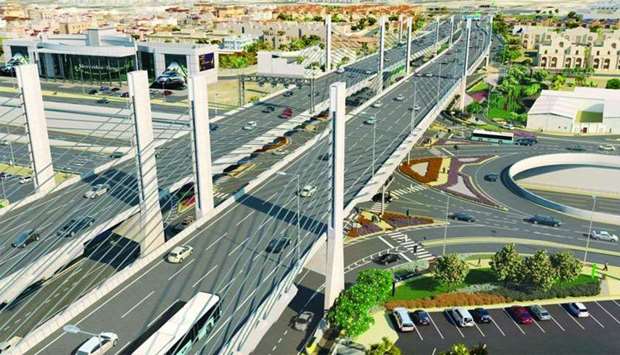The Public Works Authority (Ashghal) has defeated the unjust blockade against Qatar if its track record after June 5, 2017, is taken into account. As per published data, Qatar witnessed a surge in infrastructure development while a slew of innovative projects were launched after the blockade was imposed on the country.
While it comes to basic infrastructure development, Ashghal opened several roads including expressways and developed interchanges and the prestigious Sabah Al Ahmad Corridor while development works were initiated and tunnels built on various roads. The roads that were constructed and developed include Doha Expressway, Lusail Expressway, Al Khor Expressway, Al Majd Road, Al Wakrah Main Road, Al Wukair Road, Mesaieed Road, Hamad Port Road and Al Rayyan Road. It’s worth mentioning that construction of Al Khor Road and Orbital Highway that provides a direct link with a number of stadiums such as Al Rayyan Stadium, Al Khor Stadium, Lusail Stadium and other sports facilities was completed ahead of the schedule.
Recently, Yousef Abdulrahman al-Emadi, Projects Affairs Director at Ashghal, noted that Ashghal overcame the blockade and it continued to implement proposed projects as per the schedule. “Some of the projects were completed before deadlines,” he said citing example of Al Khor Road that was delivered one year before the deadline.
Speaking at Project Qatar 2019, the official stated this was a major achievement and Ashghal is keen to ensure time bound completion of its projects in order to help the country achieve the objectives of Qatar National Vision 2030. To add to this, Ashghal has so far completed more than 90% of the road network connecting 2022 FIFA World Cup facilities.
The post-blockade period witnessed development works of Sabah Al Ahmad Corridor with a length of 25km and total works of 37km. The corridor will have the first cable-stayed bridge in Qatar as well as the largest intersection, longest bridge, deepest and longest bi-directional tunnel. Interchanges that were developed included Simaisma, Bani Hajer, Interchange ?, Pearl and Onaiza and Al Khaleej Al Gharbi. While works of Mesaimeer outfall tunnel were started Ashghal opened a two-way tunnel in Qatar on Al Rayyan Road Project along with a new bridge and tunnel on Al Rayyan Road linking Al Furousiya Street with Al Huwar Street. New tunnel at Al Gassar interchange and two tunnels at Pearl Interchange as part of Lusail Expressway were also opened while Ashghal dedicated the underpass beneath F Ring Road and Mesaimeer Road and Al Rayyan interchange flyover for Qatar.
Sewage and water treatment
In order to help Qatar effectively implement effective waste management and waste water treatment measures, Ashghal has started upgradation of sewage pumping stations at New Salata, Al Mansoura, Al Messila, and Al Rayyan. The project is aimed at increasing the capacity of the pumping stations by 62% to 211% in order to accommodate both current and future sewage flows. Besides, the Public Works Authority launched Al Wakra and Al Wukair Sewage Treatment Plant project that will be implemented through a public-private partnership contract. Ashghal has completed works of western branch of the main trunk sewer in Doha South Sewage Infrastructure Project.
Health sector
After the blockade was imposed, Ashghal contributed remarkably to the development of Qatar in the health sector. The Public Works Authority signed six new health projects with a total cost of about QR1bn. The projects include health centres at Al Khor, Al Wakrah South, Al Sadd, Al Mashaf, and Ain Khalid to serve around 3,500 visitors per day. Ashghal has signed a contract to build the National Health Laboratories building. Besides, Ashghal completed construction of the new Trauma and Emergency Department at Hamad General Hospital. The new building has a total area of 27,000 sq m while Ashghal reconstructed 3,000 sq m of the previous Emergency Department to cover a total area of 30,000 sq m.


